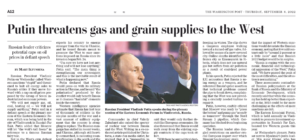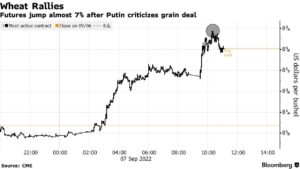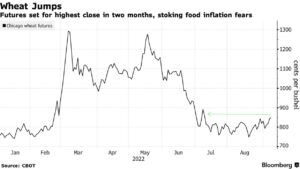China has bought about 12 million metric tons of U.S. soybeans, fulfilling a U.S.-stated pledge to purchase that volume by the end of February, three traders told Reuters on Tuesday,…
Putin Criticises Black Sea Export Deal, While Drought Takes “Hefty Toll” on U.S. Production
Financial Times writers Polina Ivanova, Roman Olearchyk, Henry Foy, and David Sheppard yesterday that, “Vladimir Putin has criticised a grain deal signed with Ukraine that unblocked agricultural products trapped in the country by his government’s military assault, threatening an agreement that had eased a growing global food crisis.
“In a speech on Wednesday, the Russian leader blamed global grain shortages — which have particularly affected poorer countries — on the terms of the deal brokered in July, rather than on the war launched by Russia against Ukraine, a major grain exporter.
“He claimed that grain shipments released by the deal, which ended Russia’s blockade of Ukraine’s Black Sea ports in the Odesa region and enabled cargo vessels carrying grain and other food to restart deliveries, were not heading to poor countries.”
This infographic shows detailed information on vessels traffic and the volume of agricultural products export #BlackSeaGrainInisiative pic.twitter.com/G8PuOYOy6o
— Oleksandr Kubrakov (@OlKubrakov) September 7, 2022
The FT article noted that, “All Black Sea grain shipments are logged by the UN, which brokered the deal. According to its public logs, more than 2mn metric tons of grain have been transported from Ukrainian ports on 87 ship voyages since the deal was penned.
“A UN spokesperson for the Black Sea grain initiative said 30 per cent of grain and food products from Ukraine had gone to low- and lower-middle- income countries, Reuters reported.”
Mary Ilyushina reported in today’s Washington Post that, “Putin claimed that most of the grain recently released from Ukrainian ports thanks to a Turkey-brokered deal to end a Russian blockade was going to the European Union instead of developing nations.

“Accusing the West of ‘colonial’ behavior, Putin said grain shipments to Europe should be cut off.”
Meanwhile, Reuters writers Margaryta Chornokondratenko and Tom Balmforth reported yesterday that, “Russian complaints about a landmark deal allowing Ukraine to export grain from ports in the Black Sea are ‘flabbergasting‘ as the deal gives Moscow no role in determining where the grain goes, a Ukrainian presidential adviser said on Wednesday.
“‘The agreements signed in Istanbul … concern only one issue, and that is the transfer of cargo ships through the Black Sea,’ Mykhailo Podolyak, an adviser to Ukrainian President Volodymyr Zelenskiy, told Reuters.”
Also yesterday, Reuters writer Michelle Nichols reported that, “Senior U.N. and Russian officials met in Geneva on Wednesday to discuss Russian complaints that Western sanctions were impeding its grain and fertilizer exports despite a U.N.-brokered deal to boost Russian and Ukrainian shipments of the commodities.”
Nichols indicated that, “Senior U.N. trade official Rebeca Grynspan met with Russian Deputy Foreign Minister Sergei Vershinin for a ‘positive’ discussion in Geneva on Wednesday, said U.N. spokesman Stephane Dujarric.”
The Reuters article added that, “U.S. State Department deputy spokesperson Vedant Patel said on Wednesday that claims that Ukrainian grain was not going to countries in need were false. He said U.S. sanctions had always provided exemptions for food and fertilizer.”
Regarding the impacts of the Black Sea export deal, Reuters writers Jonathan Spicer and Ali Kucukgocmen reported yesterday that, “A drop in global wheat prices in August was partly due to grain exports resuming from Ukraine and ensuring food and fertilizer supplies was critical to maintain a downtrend, a U.N. spokesperson for the Black Sea Grain Initiative said on Wednesday.”
However, Bloomberg writers Megan Durisin and Kim Chipman reported yesterday that, “Wheat futures climbed as much as 6.9% after Russian President Vladimir Putin criticized a recent grain deal with Ukraine, heightening attention on the sales outlook from the Black Sea region.”

Dow Jones writer Kirk Maltais reported yesterday that, “Grain traders see potential changes to the export deal as significantly tightening world supplies.”
Bloomberg writer Sybilla Gross reported today that, “Russian President Vladimir Putin’s criticism of the grain deal with Ukraine and the surge in wheat prices highlighted the fragility of the global crop trade, raising the specter of higher food prices to come.”

With respect to U.S. production variables, Laura Reiley reported in today’s Washington Post that, “Farmers, agricultural economists and others taking stock of this summer’s growing season say drought conditions and extreme weather have wreaked havoc on many row crops, fruits and vegetables, with the American Farm Bureau Federation suggesting yields could be down by as much as a third compared with last year.

“American corn is on track to produce its lowest yield since the drought of 2012, according to analysts at Rabobank, which collects data about commodity markets. This year’s hard red winter wheat crop was the smallest since 1963, the bank’s analysts said. In Texas, cotton farmers have walked away from nearly 70 percent of their crop because the harvest is so paltry, according to the U.S. Department of Agriculture. The California rice harvest is half what it would be in a normal year, an industry group said.”





